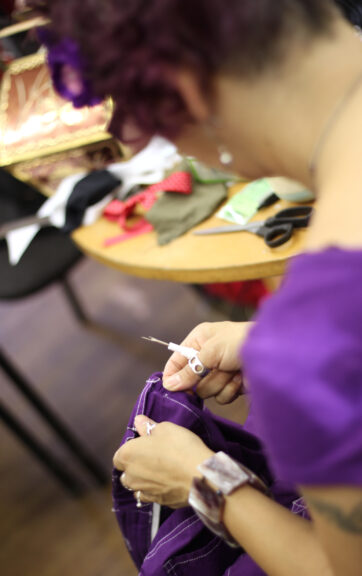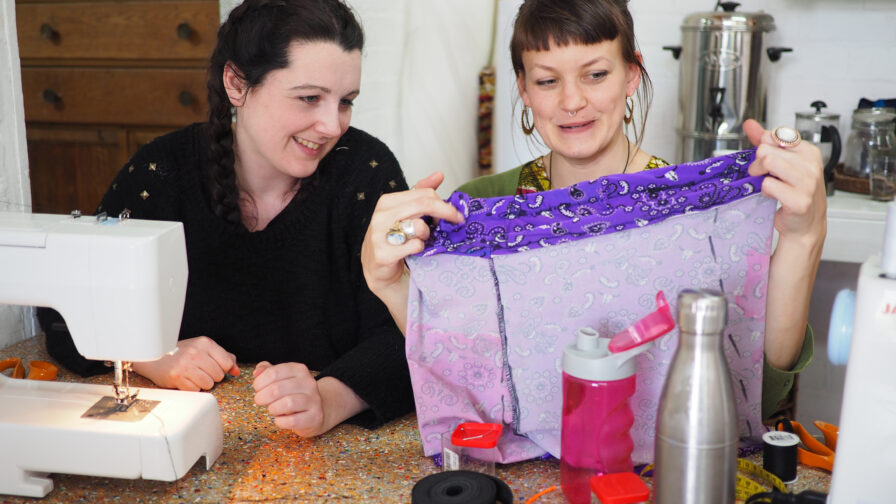Sustainable fashion co-op Stitched Up has announced new dates for its popular Bee Well Crafternoon courses.
The Crafternoons, which were cancelled during the first lockdown in 2020, will once again provide a safe and welcoming space for people living with mental health difficulties to socialise and support each other, whilst learning new hobbies and skills.
The Crafternoons are a ten week creative sewing course for adults facing mental health challenges. Activities include clothes mending, upcycling, and wool crafts, teaching both practical skills and creative expression.
There is growing evidence to show that arts promote healing, for example by allowing people to express emotions without using words and creating social connections.
Sarah Revington, Stitched Up Co-Director, said: “I really love facilitating the Bee Well Crafternoons course – it’s great to see our participants relax and grow in confidence with each session.”

Greater Manchester Mental Health Services created the Manchester Wellbeing Fund in 2017 to build up community support for mental health, and has funded similar projects across GM. The fund was only supposed to make grants until October 2020. However, due to reduced services during the pandemic, it extended funding until March 2022.
The new funding enables Stitched Up to resume face-to-face sessions at Gorton Monastery on Thursdays starting 3rd March, as well as new sessions at Chorlton Scout Hut on Wednesdays starting 2nd March. The sessions will run weekly for ten weeks and are free to attend. Members will also get access to a non-compulsory group chat where they can share ideas in their own time and support one another.
The support that these groups provide is essential in Greater Manchester, where figures of mental health issues are above average in the country. The Greater Manchester Combined Authority found that rates of contact with mental health service are around 3,981 per 100,000 people, compared to a national average of 2,176. These services cost around £615m annually, showing the importance of focusing on day-to-day wellbeing to reduce the strain on treatment and crisis care. Since arts can be used as a non-medical treatment for mental health issues, investing in groups could save money in the long term.
Whilst mental health issues make up over 20% of public health complaints in the UK — more than cancer and cardiovascular disease — mental health support is lacking. During the pandemic, outreach to mental health crisis lines almost doubled on certain days, with mental health charity Mind warning of “permanent scarring” if we do not face the mental health crisis caused by the coronavirus pandemic.
“Learning to knit has given me a renewed love for craft and I’m feeling more positive and inspired than I have in years.
A previous participant of the Crafternoons.
Bridget Hughes, Head of Operations at Greater Manchester Mental Health NHS Foundation Trust, said: “Community-led projects play a vital role in both supporting and preventing mental ill health. They offer wellbeing opportunities for people at every stage in their recovery journey, in a welcoming and familiar setting.”
A previous participant of the course described the benefits, saying: “Learning to knit has given me a renewed love for craft and I’m feeling more positive and inspired than I have in years. It has helped me to switch off and given me a hobby — something to do outside of parenting.”
Studies suggest that the most commonly used coping strategies for parents in lockdown were spending time away from family and reducing pandemic media consumption, which alters interpersonal relationships and can result in lack of essential information about coronavirus.

The Crafternoons provide support from others in similar situations whilst allowing independent time and creative expression. After attending the groups, participants are encouraged to continue building the relationships they have formed and creating art at home, both of which become essential coping strategies.
“It’s especially rewarding when the group really bond together and continue to support one another out in their communities after the course ends,” Revington says.
To get involved with the group, contact Stitched Up by email at hello@stitchedup.coop.
For mental health help from GMMHS, you can ring their free mental health helpline 24/7 on 0800 953 0285 if you live in Bolton, Salford, Trafford or Manchester; or on 0800 051 3253 if you live in Wigan.
The Meteor is a media co-operative on a mission to democratise the media in Manchester. To find out more – click here.
Sign up to The Meteor mailing list – click here.
Feature image: Stitched Up


Leave a Reply